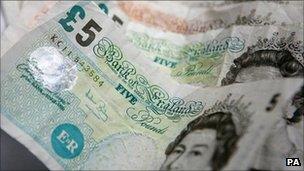Minimum wage to rise by 11p an hour
- Published

The national minimum wage currently stands at £6.08 an hour for people aged 21 and over
The national minimum wage will rise by 11p to £6.19 an hour in October, the government has announced.
This is a rise of 1.8% from the current level, which is lower than the current inflation rate.
The minimum wage for workers aged under 21 will be unchanged - a decision that has been criticised by union leaders.
The minimum wage was introduced in 1999 at £3.60 an hour for adults. The level is recommended each year by the Low Pay Commission.
The changes to be made in October echo the recommendations made by the commission.
'Balance'
The cost of living rose by 3.6% in the year to January, according to the most recent Consumer Prices Index (CPI) measure of inflation.
However, October's rise in the minimum wage is much more in line with the average increase in earnings, which rose by 1.4% over the year to January, the latest official statistics show.
The freeze in the minimum wage for those aged under 21 means that from 1 October:
The rate for 18 to 20-year-olds will remain at £4.98 an hour
The rate for 16 and 17-year-olds will remain at £3.68 an hour
However, the rate for apprentices will rise by 5p to £2.65 an hour
Business Secretary Vince Cable said that the decision marked the "right balance between pay and jobs".
"In these tough times freezing the youth rates has been a very hard decision - but raising the youth rates would have been of little value to young people if it meant it was harder for them to get a job in the long run," he said.
However, TUC general secretary Brendan Barber said the minimum wage should have kept pace with inflation.
"It is wrong to deny young people an increase this year, as there is no evidence that the minimum wage has had an adverse impact on jobs," he said.
"The reason why firms have not been hiring enough new workers is because they lack confidence in this government's ability to set the UK on course for a sound economic recovery. There is now a real danger that young people will view minimum wage work as exploitative."
David Norgrove, who chaired the Low Pay Commission's discussions, said the decision was unanimous, despite all the economic uncertainties and the different pressures on low-paid workers and businesses.
John Longworth, director general of the British Chambers of Commerce, said the employers' organisation was "disappointed" with the decision to raise the minimum wage.
"While the pressures of inflation are hurting many people, especially the lowest-paid, this decision adds significantly to the cost of doing business, and feeds wage inflation at higher levels," he said.